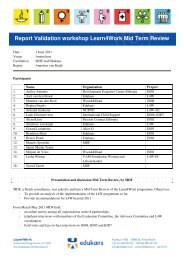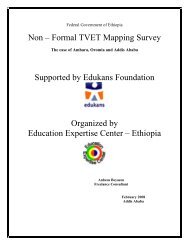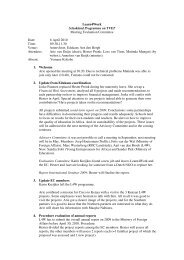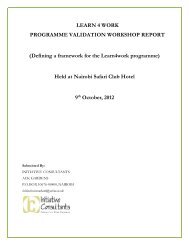DRAFT TECHNICAL AND VOCATIONAL EDUCATION AND ...
DRAFT TECHNICAL AND VOCATIONAL EDUCATION AND ...
DRAFT TECHNICAL AND VOCATIONAL EDUCATION AND ...
Create successful ePaper yourself
Turn your PDF publications into a flip-book with our unique Google optimized e-Paper software.
9<br />
numbers. Religious bodies such as the Roman Catholic, the E. P. Church, and the<br />
Presbyterian Church of Ghana all have vocational training institutions. A UNESCO survey<br />
(2003) that sampled 30 vocational institutions in Ghana found that one third of them were<br />
owned by religious bodies. The Presbyterian Church has a special unit called Vocational<br />
Training for Females which is an advocacy group, a training provider, and promoter of nontraditional<br />
female skills training for females. Other NGOs that are active in the TVET sector<br />
are the Young Men’s Christian Association (YMCA), the Young Women’s Christian<br />
Association (YWCA), the Ghana Federation of the Disabled (and its affiliates), and the<br />
Opportunities Industrialization Centre (OIC).<br />
Industry groups such as the Association of Ghana Industries and the Ghana Employers’<br />
Association are becoming active in the TVET sector. Previously they were passive providers<br />
of opportunities for industrial attachment (or work-based learning) but now they are engaged<br />
in negotiations and in the piloting of more structured industrial attachment with tertiary TVET<br />
institutions.<br />
2.5 Key Donors and their Interventions<br />
The TVET sector was left out of the Educational Reform programme that began in 1987.<br />
With the support of the World Bank and other donors, government focused attention on the<br />
vocationalisation of the secondary school which prepared students for higher education rather<br />
than the labour market. Donor involvement in the TVET sector has been on a low scale<br />
compared to other areas of development. A few notable donor interventions that have<br />
occurred in the last decade are described briefly.<br />
Japan International Cooperation Agency (JICA). JICA gave technical and financial<br />
assistance for the development of a Master Plan for Technical Education in 2000 -2001.<br />
Though JICA’s plan was not implemented, it made a major impact on the development of a<br />
National TVET Policy for Ghana. For example, the policy of introducing competency-based<br />
training and a national qualification framework with the supporting structures were informed<br />
by the JICA Master Plan. Since 2004, JICA has set up a Technical and Vocational Education<br />
and Training Support (TVETS) Project which facilitated the passage of the COTVET Law,<br />
developed detailed implementation plans for COTVET, and has been piloting CBT in<br />
vocational training institutions and the polytechnic.<br />
Royal Netherlands Government. Between 1999 and 2003 the Dutch Government assisted<br />
Ghana by re-equipping and refurbishing 15 technical institutes and 5 secondary/technical<br />
schools under the VOTEC Resource Centres Project (Duodu, 2006). Since 2004, several<br />
Nuffic projects have been going on in all the polytechnics of Ghana. The Leadership and<br />
Management Capacity Building project covers all the ten polytechnics. In addition, CBT<br />
curricula are being piloted in four fields in the polytechnics: Agriculture Engineering,<br />
Fashion Design, Building Construction, and Automobile Engineering. The third major Dutch<br />
intervention is in the establishment of the Ghana Skills Development Centre (GSDC) at<br />
Tema. The GSDC was initiated by Vlisco Helmond B.V. of Netherlands and its local<br />
subsidiary Texstyles Ghana Ltd as a public-private partnership intervention that brought<br />
together Development Partners (including Netherlands and UK’s DfID), the Government of<br />
Ghana, and about 15 local industries to establish an industry-driven skill training facility that<br />
would focus on hands-on-skills to meet the needs of industry.<br />
The World Bank. The World Bank funded the Vocational Skills and Informal Sector<br />
Support Project (VSP). The project aimed among other things “to redirect both public and<br />
private vocational training institutions towards the provision of short, focused, practical,<br />
competency-based and demand-driven training for people in the informal sector in five<br />
selected occupational areas, namely: Electrical installation, Carpentry and Joinery,







